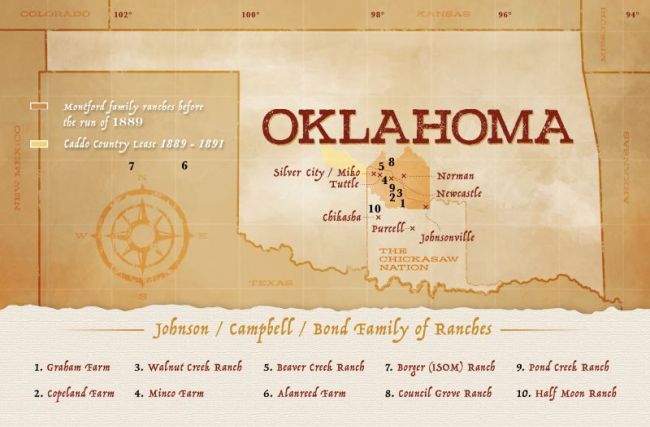Charles B. Campbell, the only son of Michael and Adelaide (Johnson) Campbell, and his relatives claimed much of present Grady County and portions of McClain County. His uncle Charley Campbell operated a large ranch near Chickasha. His stepfather, James Bond, ranched at Silver City. His father-in-law, William "Caddo Bill" Williams, ran the Half Moon Ranch near Verden. Montford Johnson and his son Edward Bryant (E. B.) Johnson had ranches around Silver City and near present Newcastle and Washington [1].

Map courtesy of the Chickasaw Nation
Around 1900, Charles Campbell and E. B. Johnson purchased the Half Moon Ranch, buying all of the cattle and 12 of the horses. Before long, Charles Johnson’s ranch was known for its race- and polo horses. He exported horses to England and other European countries, as well as New York City, Chicago and St. Louis. His ranch introduced the game of polo to Oklahoma and First American territories, with his cowboys often defeating better-dressed teams from the eastern United States. He raised Thoroughbred racehorses including Bowling Green, Mint, Black Toney and Bear. His best-remembered horse, U-See-It, which he sold for little money, foaled Black Gold for the Hoots Ranch, with Black Toney as the father. Black Gold won the 1924 Kentucky Derby [2, p. 273].
Charles Campbell eventually bought out E. B. Johnson and gained control of the Half Moon Ranch. In 1920, he built a large house in Chickasha and administered his ranching operations from there. Around then, he made ill-advised business deals with his cousin, Ben Johnson, and J. D. Suggs, losing most of his assets and ranch. Charles Campbell died on Feb.25, 1925, and is buried at Rose Hill Cemetery in Chickasha.